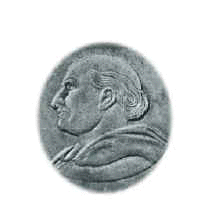 |
 |
||
|
|
This site reflects heightened contemporary interest in Bartolomé de Las Casas. It provides information, research, and analysis of the life and writings of the person who has become a symbol of justice and human rights in Latin America and elsewhere. Sources for the study of his life are provided. Space will be given to discussion of controversies, as well as focus on persons who have exemplified the spirit of Las Casas.
|
||
New center at Oxford University honoring Las Casas.Las Casas Centre for Human Rights at Blackfriars Hall, Oxford University; Director Francis Davis. The Institute aims to examine difficult questions in the spirit of dialogue, mutual respect, and friendship that is central to the Dominican intellectual tradition, enquiry, and disputation. In 2010, the Las Casas Institute will be offering the first service learning scholarships in the University. NEW BOOK: Recent Itallian publication on Las Casas: Controversia tra Las Casas e Sepúlveda, mas Saverio Di Liso. SaveSaverio Di Liso is professor of the History of Philosophy at the School of Theology, Pugliese, Bari, Italy.
Approaches
to Teaching the Writings of Bartolomé de Las Casas |
|||
|
The Tradition of Human Rights in Latin America and Its Relation to Bartolomé de Las Casas
Two Harvard University Law-related professors have delineated the key role of Las Casas: Paolo Carozzo, "From Conquest to Constitutions: The Latin American Tradition of Idea Of Human Rights," Human Rights Quarterly 25, 2 (May 2003) "The modern idea of human rights had a period of gestation lasting millennia. But it would be fair to say--even if it is not commonly recognized--that its birth was in the encounter between sixteenth century Spanish Neo-Scholasticism and the New World. If that encounter were embodied in a single person, it would be Bartolomé de Las Casas." (p.289) For whole article, click here |
|||
|
Controversias Sobre Bartolomé de Las Casas Una leyenda hábilmente urdida pos los detractores de Las Casas fue que él fue el introductor de la esclavitud en América. Isacio Pérez Fernández intentó desmantelar la leyenda de un Las Casas esclavista en su libro, Bartolomé de Las Casas: ¿Contra los negros? (1991). Por contraste, el autor mostró que Las Casas fue el primero que denunció las esclavización de los afro-americanos, una vez que conoció la realidad de la trata y de unos pueblos con un mundo y una cultura propia.
|
|||
|
Ponencia sobre el Obispo Nicaraguanüense Antonio de Valdivieso, O.P., Contemporaneo de Las Casas Por Clemente Guido Martinéz EL INTERÉS DE LAS CASAS POR LOS INDIGENAS Y LA EVANGELIZACIÓN EN EL BRASIL Actitud creciente de Las Casas en la cutlura y la iglesia brasileñas hoy Carlos Josaphat Oliveira de Pinto, O.P. Ponencia recién presentada |
|||
|
The remarkable story of Las Casas is one of the centerpieces of the latest book of "one of the most wide-ranging historians of modern times." (N.Y. Times, 25, 25/vii/04). |
Recent Work
Hugh Thomas Rivers of Gold: The Rise of the Spanish Empire |
||
|
“The Unheard Voice of Law from an Often Heard Text: A New Rendition of Bartolomé de las Casas’ Brevísima Relación de la Destruición de las Indias.” by Fr. David Orique, University of Oregon. Friday, 19 September 2008 at 3:30 pm in the Albertson Room (Doré Theater) http://www.csub.edu/history/news.htx
The appearance of the icon of Las
Casas here
is by permission of St. Gregory Webmaster: Lawrence A. Clayton Comments to:
lclayton@simplecom.net |
|||





 Bartolomé
de las Casas and the Conquest of the Americas, a contribution to
the series Points of View/Puntos de Vista, released Jan., 2011.
The book uses the life of Las Casas as the vehicle for exploring and
explaining the age of the Encounter.
Bartolomé
de las Casas and the Conquest of the Americas, a contribution to
the series Points of View/Puntos de Vista, released Jan., 2011.
The book uses the life of Las Casas as the vehicle for exploring and
explaining the age of the Encounter.